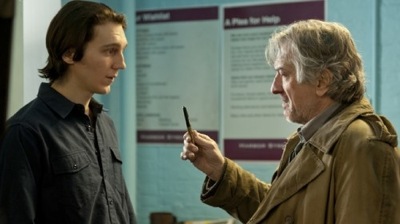By the degraded standards of Robert De Niro’s film career Being Flynn, which opens in exclusive engagements today, is a good day at the office. A satisfying movie it’s not–I doubt it’ll be moving much past the “select cities” it’s been launched in–but for once it’s not the actor’s fault. Face it, De Niro deserved the beating I gave him in November, when, in an open letter to Al Pacino, I said he’s spent “an awful long time on the wrong side of the tracks, in slummy movies.” Since 2000 alone: 15 Minutes, The Score, Showtime, Analyze That, Godsend, Meet the Fockers, Hide and Seek, Righteous Kill, Little Fockers, and New Year’s Eve, with the egregious Godsend and Hide and Seek equivalent to a double homicide, enough to send anyone to movie jail for a long stretch. And those are just the worst offenders–the better ones, like Everybody’s Fine and Stone, aren’t all that hot, either. Plus he’s a lousy talk show guest. Lousy. The prosecution rests.
But, having buried Bob, let me upend Shakespeare and praise him. Two Oscars, four additional nominations, and many terrific movies in his prime, some classics that are sure to endure. A worthy career as a producer and director. Steward of the nobly conceived Tribeca Film Festival, which has improved. Proud New Yorker through and through. He earns every second chance he gets; more’s the pity that audiences have to keep extending them, as if he’s a favorite uncle, gone to hell on booze, that we can’t quite give up on.
 De Niro is 68, an age when actors are obliged to find new ways to stay in the spotlight as it turns in a more youthful direction. (For film actresses it’s 58. Maybe 48.) Dustin Hoffman, months away from his 75th (75th!) birthday, has managed it more gracefully than most, mellowing into character leads and an HBO gig on Luck that lets him be quiet and courtly, two qualities I doubt even he thought he possessed in his prime. De Niro, though, coasts, or sleepwalks, or coasts and sleepwalks through these duds, finding nothing to chew on in the stringy material, or falling back on past glories that have crumpled into shtick. Look at the trailer for Being Flynn; he’s a crazy reprobate who’s actually driving a taxi…and, indeed, cast De Niro in the part and the character of Jonathan Flynn can’t help but suggest Travis Bickle, or Cape Fear‘s Max Cady, as pensioners still living off the grid in their senior years. But Flynn, a delusional ex-jailbird, in and out of flophouses and shelters, is a real person, and De Niro is more than ready to inhabit him on film.
De Niro is 68, an age when actors are obliged to find new ways to stay in the spotlight as it turns in a more youthful direction. (For film actresses it’s 58. Maybe 48.) Dustin Hoffman, months away from his 75th (75th!) birthday, has managed it more gracefully than most, mellowing into character leads and an HBO gig on Luck that lets him be quiet and courtly, two qualities I doubt even he thought he possessed in his prime. De Niro, though, coasts, or sleepwalks, or coasts and sleepwalks through these duds, finding nothing to chew on in the stringy material, or falling back on past glories that have crumpled into shtick. Look at the trailer for Being Flynn; he’s a crazy reprobate who’s actually driving a taxi…and, indeed, cast De Niro in the part and the character of Jonathan Flynn can’t help but suggest Travis Bickle, or Cape Fear‘s Max Cady, as pensioners still living off the grid in their senior years. But Flynn, a delusional ex-jailbird, in and out of flophouses and shelters, is a real person, and De Niro is more than ready to inhabit him on film.
Flynn, who fancies himself a writer, is just about the deadest of deadbeat dads, and his uexpected eruption into the life of his son Nick (Paul Dano) after an 18-year absence is the crux of Being Flynn, which is based on Nick’s acclaimed 2004 memoir Another Bullshit Night in Suck City. Being…well, already you sense what the problem is with writer/director Paul Weitz’s earnest, conscientious, and almost entirely flat adaptation. Clearly Another Bullshit Night in Suck City wasn’t going to cut it as a movie title, or even as PR, which prints the word as “bulls–t,” as if us hacks couldn’t take it. But Being Flynn is a title that’s bleary-eyed from exhaustion. The whole movie is that way, actually, as if Weitz, who received an Oscar nomination for adapting About a Boy, spent so long trying to get the movie made that he boiled the essence right out of the story he wanted to tell.
Or it could just be that the director of American Pie, Cirque du Freak: The Vampire’s Assistant, and–the horror—Little Fockers wasn’t the best person to tell it. About a Boy and the underrated In Good Company, by default his two best films, cover some tricky emotional ground with a deft touch, which is absent from this strenuously serious portrait of addiction and homelessness. (Badly Drawn Boy, whose music gave About a Boy a lift, drone through Being Flynn.) Thrown out of yet another apartment, Jonathan wheedles his way back into Nick’s life, which isn’t much of a life, given his inability to commit to anyone or anything. A job at a homeless shelter, offering a shot at clarity for the younger man, sours when Jonathan winds up in one of its beds, following the inevitably uncomfortable reunion between father and son. Worse is to come, as Nick, who is struggling to find his own voice as a writer, slips into crack addiction, and the uncontrollable Jonathan ends up on the mean streets of Boston in winter.
 No focking around here. Yet for all the pallid, institutional lighting by DP Declan Quinn and Sarah Knowles’ rundown sets the movie, all too plainly shot in New York, never feels authentic. Dano, overpowered by Daniel Day-Lewis in There Will Be Blood, is better at mopey comedy than mopey drama, and the script soft-pedals Nick’s plight, with his addiction presented as something akin to a stomach virus. The women who flit through–Olivia Thirlby as a hard-shelled girlfriend, Lili Taylor (Nick Flynn’s real-life wife) as a shelter worker–have little to do, and are typically observed through Nick’s voiceover, which is meant to give the film a shot of his poetry but robs them of their voice. Seen in softly lit flashbacks is Julianne Moore as Nick’s mom, a lady presented as so saintly and cheerful that her one-scene decline makes no dramatic sense. Dano should have kept reading from the book during her puzzling interludes. The only other actor who makes any impression is the powerful Wes Studi (The Last of the Mohicans), who stamps the small role of the shelter manager with his customary authority.
No focking around here. Yet for all the pallid, institutional lighting by DP Declan Quinn and Sarah Knowles’ rundown sets the movie, all too plainly shot in New York, never feels authentic. Dano, overpowered by Daniel Day-Lewis in There Will Be Blood, is better at mopey comedy than mopey drama, and the script soft-pedals Nick’s plight, with his addiction presented as something akin to a stomach virus. The women who flit through–Olivia Thirlby as a hard-shelled girlfriend, Lili Taylor (Nick Flynn’s real-life wife) as a shelter worker–have little to do, and are typically observed through Nick’s voiceover, which is meant to give the film a shot of his poetry but robs them of their voice. Seen in softly lit flashbacks is Julianne Moore as Nick’s mom, a lady presented as so saintly and cheerful that her one-scene decline makes no dramatic sense. Dano should have kept reading from the book during her puzzling interludes. The only other actor who makes any impression is the powerful Wes Studi (The Last of the Mohicans), who stamps the small role of the shelter manager with his customary authority.
Today Jonathan Flynn is in an assisted living facility. Being Flynn is a rebuke to anyone who thinks that De Niro, based on his run of bum work, is ready for same–but he might have been so much better in a movie truer to Another Bullshit Night in Suck City.





Comments